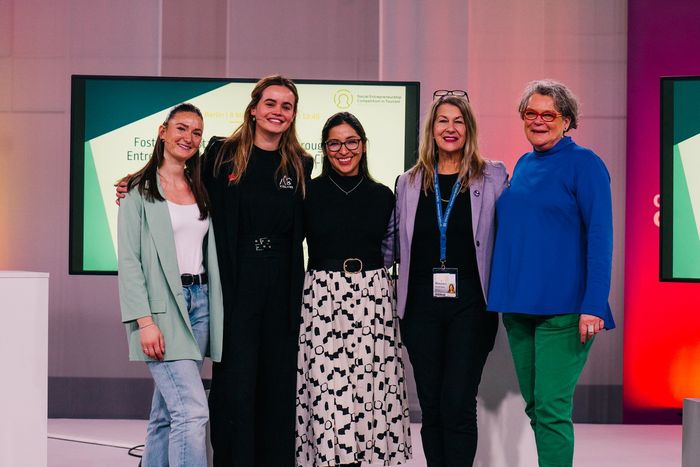Claudia Brözel is Professor of Marketing and eCommerce in Tourism at the University for Sustainable Development Eberswalde. In 2019, she launched the first global competition on social entrepreneurship in tourism, entitled Social Entrepreneurship Competition in Tourism. We would like to know from her what experiences she has had since then and, above all, what potential social enterprises have for the sustainable transformation of the tourism industry as a whole.
You launched the first competition on social entrepreneurship in tourism in 2019, the "Social Entrepreneurship Competition in Tourism." What motivated you to do this?
CB: I am an economist and have been thinking critically about tourism for a long time. I was always interested in improving the tourism system. I have the feeling that development aid remains ineffective in many places and ends up benefitting us rather than the aid recipients. I, however, wanted to create something that would provide all stakeholders with equal opportunities. It has always been my approach to look for solutions that are activating – that is, to create an offer to change things.
I strongly believe that competitions – if you create a big platform with a level playing field where everyone has access to – can actually bring innovation and change to the industry. In the case of social entrepreneurship, they can also bring transformation to the sector.
What does social entrepreneurship or social enterprise actually mean? What criteria does a social enterprise have to fulfil in order to take part in your competition?
CB: First and foremost, the answer to that is very simple: impact comes before profit. In our traditional economy, this means: "Okay, what do your KPIs (Key Performance Indicators) look like? What's at the top?" I have to make a profit, of course, to keep my business going. So economic sustainability is always part of it, but it is a question of priorities.
We have a Launch Track and a Growth Track. In the Launch Track, any initiative can apply, even if it is still in “idea status.” To apply in the Growth Track, it must be a legally registered organisation. In addition, each initiative must select three SDGs (Sustainable Development Goals) that it supports. Then it is primarily about the business model: "Where do you see your impact in what you do? What is the problem you are trying to solve and how are you going to do it?"
You say "impact comes before profit." Is there a sharper distinction there? What about big companies that run their business regularly but invest a lot of money in social projects and call it impact. Are these social enterprises too?
CB: There are more and more of these types of companies, and rightfully so. You have philanthropists and you have companies that have a different business model but invest part of their turnover in social projects. From my point of view, this is a transitional phase, i.e. that various large companies now also address social sustainability issues. I think that is great, everyone should do that. However, to partake in our competition, impact has to be an inherent part of the business model.
What does impact mean with regard to the sector as a whole: can social enterprises also have an impact "beyond their bubble" on the business activities of "conventional actors”?
CB: There are large foundations, such as the UnTours Foundation or Planeterra, which do exactly that, i.e. they have a parent company with a different business model and then additionally a foundation with which they promote and build up social or ecological initiatives, for example. Also the TUI Care Foundation, which has supported us for two years now: These are large tour operators that have noticed that their credibility and their business model – especially with regard to the younger generations – work much better when they can say "we are saving turtles here" or "we are doing an educational project for women here." I think the first step towards transformation is this attention to the problems, followed by the particular course of action a given project takes.
The next step would then be – and this is where we are lacking on many fronts – that TUI, for example, could say today, "Okay, we'll do a common good balance sheet and work according to this model from tomorrow." They can say: "We are moving in such a direction." A remarkable number of hotels in the DACH region are already doing that. The hotel business lends itself to a common good certification. In the hotel industry, people are at the centre. There is a very clear social component, for which reason a lot is already happening. But there is still no legal form for social enterprises in Germany. In this respect, we are not yet far enough.
Is there also a risk that social entrepreneurship could turn into "greenwashing" or "socialwashing"?
CB: The risk is always on the side of the money. It is always a question of who gives money to whom and for what purpose. There are foundations that set up funds to invest in social startups. This can be very helpful for the founders, but it is also usually the case that the investors then own shares in the business or have a say in it.
This is an exciting approach that can lead to more social enterprises. But of course, it can also mean that an investment is masked with an ulterior motive. I think that when someone gives money – not just as a risk capital – it also means that they believe in the idea. So I wouldn't want to make a blanket accusation of socialwashing.
How can social enterprises in tourism contribute to the integration and participation of vulnerable groups?
CB: This immediately makes me think of this year’s winner in our Growth Track: Wheel the World. Alvaro Silberstein is in a wheelchair himself, but he always wanted to travel and do mountaineering or outdoor sports. With Wheel the World, he wanted to enable mobility-impaired people to participate in such experiences in a normal way. Together with his team, he designed an itinerary, applied to us, won first place, and is now already working with major booking platforms. This goes to show that the Competition helps to bring much-needed innovations to the market.
Overall, it must said – however vulnerable groups are defined – that the Competition is open to everyone because of the low-threshold offer. We attract many female founders, 60% of our applicants are women. For example, this year an initiative by an Italian woman won second place, The Valuable Network, which brings people with Down syndrome into top hotels. And that raises awareness and offers a different outlook on the issue of Down syndrome. It sends a message that people with Down syndrome do not have to be locked away, but that it can be an enriching experience to meet them.
The Social Entrepreneurship Competition in Tourism is still in the start-up phase. The team is happy about any kind of support, especially about sponsors who make it possible for us to continue with this Competition. More information can be found here. You can also follow us on social media: Instagram - Facebook - LinkedIn






